Cotton is one of the most versatile textiles. You can find it in almost anything, from t-shirts and socks to household items like bedding and dishrags. With so much cotton available and present, it’s important to know how to wash 100% cotton.
You can wash 100% cotton garments and textiles by hand or by machine. Cool water, gentle laundry detergent, and air drying are the best ways to prevent shrinking, wrinkling, and fading. For heavier items like towels, however, hot water washes and tumble-drying work too.
Just because cotton is prone to shrinking and wrinkles doesn’t mean it’s hard to take care of it! Armed with the right knowledge, taking care of your 100% cotton items is straightforward. This guide will make you an expert in taking care of your cotton clothes and household textiles.
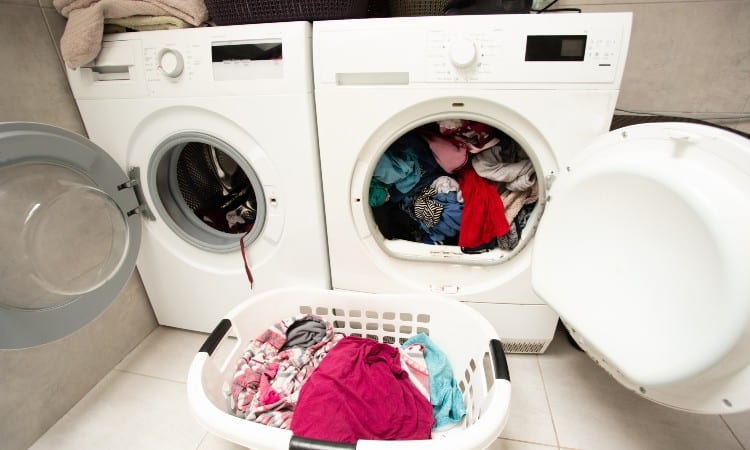
Can You Machine Wash 100% Cotton?
You can wash 100% cotton items in the washing machine, but be mindful of the settings you use. Cotton is susceptible to shrinking if you expose it to too much heat. Use a cool water cycle and a gentle laundry detergent.
There are different types of cotton that need slightly different care, too. Cotton can be a knit or woven fabric. The threads that make up the fabric come in a wide variety of sizes. The type of stitching, garment construction, dye or print pattern, and embellishments can impact the washing cycle you should use.
Follow the instructions on the garment tag carefully. If in doubt, it’s always best to use a gentle cycle rather than a standard or heavy-duty wash. Hard-wearing items like towels and dishrags can take a more aggressive cycle, but garments should get a gentler treatment.
Can You Machine Dry 100% Cotton?
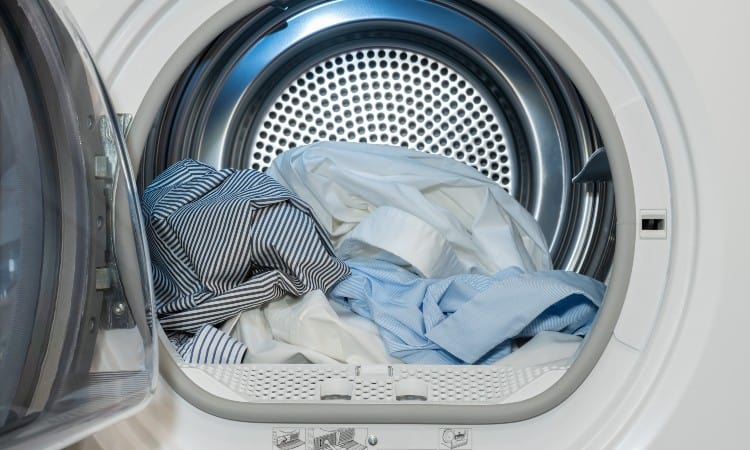
You can use your dryer to dry 100% cotton, but you should take the items out while they are still damp. Use a low-heat or permanent press setting, as too much heat will shrink your clothing. Cotton also wrinkles easily when you over-dry it, which is why a permanent press setting works well.
Like with washing, the hardier your cotton items are, the more heat and dryer time you can give them. Dishrags and towels can stay in longer, especially if you don’t mind them shrinking a little or losing some of their color. Depending on the dye type, too much heat can also make cotton textiles fade faster than they would otherwise.
Air-drying 100% cotton clothes is the best way to keep them looking and feeling their best for as long as possible. Hanging them on a clothesline or laying them out on a drying rack when they’re damp will help prevent wrinkling, too.
For lightweight cotton items like t-shirts or socks, you can hang them up without fussing over them. Heavier items like cotton sweaters or dresses might need reshaping before you let them dry.
Be mindful of where you’re drying things, too. White cotton can sit in the sun without issue. However, UV rays aren’t just bad for your skin — they can also fade the colors on your cotton fabrics. Hang your colorful cotton up inside or in the shade, even if it takes longer for it to dry. It will help make the clothing last longer.
What Temperature to Wash Cotton?
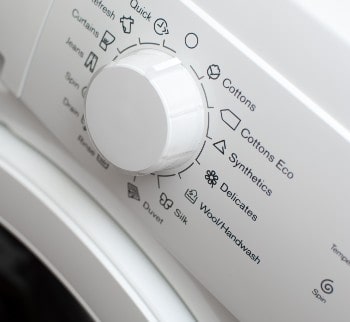 Under most circumstances, you should wash cotton items in lukewarm or cold water. Cold water helps keep colors bright and prevents fabric shrinkage. Hot water won’t shrink your cotton items as quickly as a hot dryer will, but it will fade colors and shorten the garment’s lifespan.
Under most circumstances, you should wash cotton items in lukewarm or cold water. Cold water helps keep colors bright and prevents fabric shrinkage. Hot water won’t shrink your cotton items as quickly as a hot dryer will, but it will fade colors and shorten the garment’s lifespan.
However, hot water is a good idea for heavily soiled items, especially ones that might carry germs or bacteria. The hot water will help kill the germs and rinse them out of the fabric. This is especially important for items like kitchen towels or bath towels. Keeping these items germ-free is important, especially if someone in your household is sick or at risk of becoming sick.
Ultimately, the temperature is less important than the cycle speed if you’re using a washing machine. Read the garment tags carefully to find out the recommended speed. As a rule of thumb, thinner fabrics and items with decorations or embellishments should have gentler cycles than heavy-duty items.
Does 100% Cotton Shrink in the Wash?
100% cotton can shrink in the wash, but it is more likely to shrink in the dryer. Heat is the primary reason for cotton shrinkage. Hot water might shrink the fabric slightly, but you can stretch the fibers out to their original shape and size while it is still wet.
However, drying 100% cotton at high heat sets the fibers in their new, shrunken size and makes it harder to restore them.
The reason cotton shrinks is because of the amount of tension in the threads. During processing and manufacturing, the cotton fibers stretch out of their normal size. When you wash cotton, it absorbs water, which expands the fibers and eases the tension. Without the tension in the threads, the fiber can return to its un-stretched size, causing shrinkage.
If you dry cotton at high heat when it is at the original, un-stretched size, it’s more likely to stay that way than if you let it air dry. As the water evaporates from the fabric, the tension returns and the garment will keep its intended size. That’s why it’s recommended to take 100% cotton items out of the dryer while they’re still damp.
How much cotton shrinks depends on whether or not the manufacturer pre-shrunk it. Pre-shrunk cotton will only shrink about 5%, whereas cotton that isn’t pre-shrunk can shrink down 20%. Pre-shrinking, or sanforizing, is a protective process manufacturers use to lower the likelihood of shrinking, but it isn’t a guarantee it won’t shrink at all. Even if the tag says a garment is pre-shrunk, you should still wash it with care.
How to Wash 100% Cotton Without Shrinking It
Even though 100% cotton is prone to shrinking, you can wash it without damaging it. Whether you use a washing machine or do your laundry by hand, taking care of your 100% cotton is simple.
Washing Machine
Before you toss your cotton pieces into the washing machine, you should treat them for stains (more on this later!). You don’t want to wash a stained item before treating it, or you risk setting the stain in more permanently.
Next, pick the laundry soap that’s best for your garments. Most laundry detergents work well on cotton. If you have especially dirty items, you should consider a high-performance detergent. For delicate items or brightly colored fabrics, use a delicate wash to help prevent fading and damage.
The water temperature and the cycle are more important than the soap type, however. Use cold water for bright colors and delicate items and lukewarm or tap-water cool water for everything else. Only use hot water for heavily soiled items or utility items like towels and rags.
A regular wash cycle is fine for most 100% cotton clothing. Very delicate or thin fabrics may need a gentle cycle. Check the garment tag for suggestions, and err on the side of a gentler cycle if you’re unsure.
Hand Wash
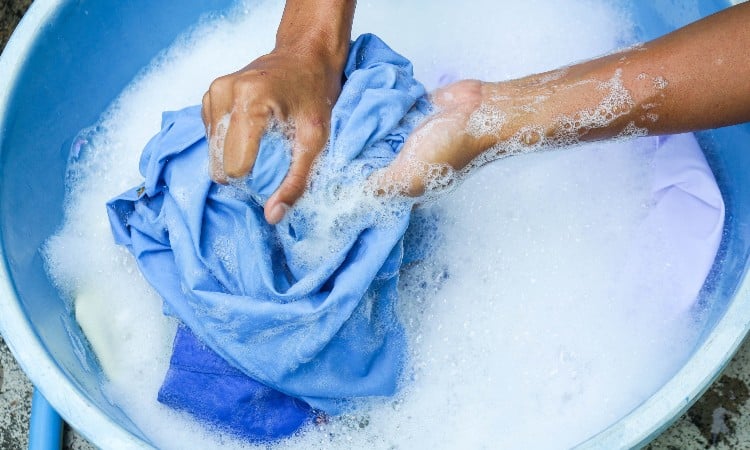
If you prefer to handwash your 100% cotton, you’ll need a large sink or basin where you can submerge your clothing all the way. Fill the sink with lukewarm or cool water and the laundry soap of your choice, then submerge the clothes.
Using a no-rinse detergent can make handwashing easier, as it will save you time on rinsing the clothes. However, if you’re willing to spend more time on laundry, any mild laundry detergent will work.
Gently agitate and swirl the clothes in the basin, and then let them soak. The laundry detergent instructions will tell you how long they should be in the water before you drain the water and rinse the clothes. If you’re using a no-rinse detergent, squeeze out the excess water and hang your clothes to dry, re-shaping heavier items as needed.
If you aren’t using a no-rinse detergent, refill the sink with cool water. Swirl the clothes again until there are no more soap bubbles. Drain the water and rinse again, as necessary. Then squeeze out the garments gently and hang them to dry.
What Is the Best Detergent for Cotton Clothes?
 Most laundry detergents work well with 100% cotton. Cotton is an easy-to-clean fiber that doesn’t have some pitfalls of other natural fibers or man-made materials.
Most laundry detergents work well with 100% cotton. Cotton is an easy-to-clean fiber that doesn’t have some pitfalls of other natural fibers or man-made materials.
Unlike silk and wool, it’s a cellulose plant fiber, not a protein fiber, so the enzymes in generic laundry detergent that damage those fabrics won’t harm cotton. Cotton also absorbs up to 30% of its weight in water, which is significantly more than synthetic fibers, so you don’t need to use the same heavy-duty formulas on cotton as you do on polyester.
Laundry detergent helps fabric fibers absorb water, and the motion of the washing machine (or your hands, if you handwash) helps lift the dirt and debris out of the fabric. Since cotton is so absorbent already, it doesn’t need much help from detergent.
The enzymes in most laundry detergent help dissolve food stains and bodily fluids like sweat and wash them away. This is important for synthetics but not necessary for cotton unless it’s heavily stained. Ultimately, the best detergent for cotton clothes is one that’s made for cold water, as that will help protect against fading.
How to Treat Stains on 100% Cotton

The best way to remove any stain is to address it as soon as possible. Often, you can wash a stain out of 100% cotton with water and regular laundry detergent if you get to it while the stain is still fresh. Stronger stains like grass, mud or red wine might need a heavier treatment.
The best stain treatment for 100% cotton clothing is oxygen-based bleach. It works on white and colorful clothing, and it works slowly, which is better for the fibers. As soon as possible after staining, you should soak the stained item in water and oxygen bleach, according to the directions on the bleach package. Then, wash as normal.
Chlorine-based bleach will also lift stains on 100% cotton. However, it does weaken the fibers, which can lead to tears or fraying. It will also leave bleach stains on colored fabrics, so you should only use chlorine bleach on whites.
If you have to use chlorine bleach, dilute it significantly with water first. This will help prevent some of the damage to the fibers. Even diluted, though, enough bleaching will wear out cotton fibers and lead to holes.
Should You Iron 100% Cotton?
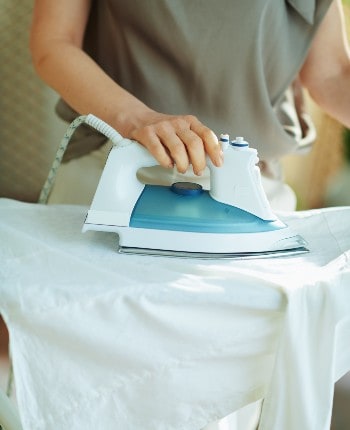 Clothing made of 100% cotton is prone to wrinkling, especially if you machine-dry it. Luckily, it is safe to iron 100% cotton textiles.
Clothing made of 100% cotton is prone to wrinkling, especially if you machine-dry it. Luckily, it is safe to iron 100% cotton textiles.
Use a low to medium heat setting when you iron cotton clothing, especially white items. It’s easy to scorch cotton, which adds a yellowish tint to the fabric. For best results, turn the item inside out before you iron it.
A pressing cloth can also protect the fabric from excess heat. You can spray the garment with water for extra steam, too, if it’s extra wrinkly. Iron in the direction of the fabric’s grain, and check under the pressing cloth periodically to make sure you aren’t damaging the fabric.
How to Make 100% Cotton Last
Cotton fibers are long-lasting and less susceptible to insect activity than animal fibers. They keep their shape longer than man-made fibers, and with the proper laundry care, they can look brand-new for years.
The best way to store cotton is to hang or fold it so that it doesn’t wrinkle. Keep it somewhere with steady temperature and humidity, like a dresser or closet. Avoid airtight containers like plastic bins as they can trap dust and dampness, damaging the fibers long-term.
Cotton is incredibly durable. However, washing it gently and storing it nicely are the best ways to make it last.
Tips for Washing 100% Cotton
Whether you wash by machine or by hand, the most important tip to remember is to keep the temperature cool. High heat will damage the size, shape, and color of your 100% cotton items.
Turning garments inside out and keeping laundry loads small will also help keep your garments clean without damaging them. Most cotton items can go through a few wears between washes unless you wear them right next to your skin.
Finally, cotton items don’t need a fabric softener to be soft. Over time, the fibers will relax and get softer without losing their strength or shape. However, fabric softener won’t damage the fibers. So if you can’t wait for next-to-skin softness, go ahead and add it to your cotton laundry.
Conclusion
Despite the risk of shrinking, washing 100% cotton is simple. As long as you avoid high heat, your cotton items can handle just about anything without getting damaged. Remember, the gentler you are, the longer your clothes will last.
What are your top tips for taking care of 100% cotton garments? Let us know in the comments!